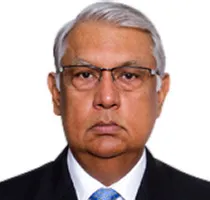-
CENTRES
Progammes & Centres
Location
New Delhi’s decision to import oil from Moscow has disappointed the US and UK, but urging us not to do so as that would help the Russian economy is blatant hypocrisy.

Russia is also culpable for causing Ukrainian civilian casualties, destruction of infrastructure and creating a humanitarian crisis.India has been asked to consider whether she will be on the “right side of history”, when books are written about the Ukraine war because of refusal to side with the US and NATO. Such rhetoric is sometimes inevitable during geopolitical tensions. Delivering veiled threats, based upon prescriptive and judgemental policies, are part of information warfare and diplomatic pressure tactics. The US and UK have been on the wrong side of history innumerable times, causing deaths of millions of civilians and humongous material damage. Russia is also culpable for causing Ukrainian civilian casualties, destruction of infrastructure and creating a humanitarian crisis. The war is not going well for Russia in the face of Ukrainian resistance. Negotiations are continuing but no agreement is in sight. Abandoned by NATO, Zelenskyy has appealed to Putin for talks. Sweeping unilateral economic sanctions seek to impose costs on Russia’s economy. There is also the fond hope that economic pain on the Russian people will lead to a regime change in Moscow. Sanctions also affect India and other countries, though we were not consulted. There is no international legal basis for these sanctions. The immediate impact has been on oil prices, a vital energy resource. India imports 80–85% of her oil and the jump in prices will affect GDP growth. Coming on the heels of Covid, the adverse economic impact is considerable. India has to source her energy needs at competitive prices. While the US has banned import of Russian oil and gas into her market, European nations have avoided sanctions for obvious reasons—they are hugely dependent on Russian oil and gas. Sanctions are being tweaked to help European countries to import Russian oil and gas, including waivers from SWIFT sanctions. New Delhi’s decision to import oil from Moscow has disappointed the US and UK, but urging us not to do so because that would help the Russian economy is blatant hypocrisy.
Sanctions are being tweaked to help European countries to import Russian oil and gas, including waivers from SWIFT sanctions.India’s answer has been to book around six million barrels of Russian oil at discounted prices. This quantity is relatively small, just about a day’s national consumption. Geopolitically driven sanctions reduced the supply of Iranian and Venezuelan oil. As part of her “Monroe Doctrine” , the US had imposed sanctions on Venezuela because the American-backed candidate lost the election. Now, America has gone scurrying back to it for increasing oil production. It has even tried to approach Saudi Arabia and the UAE to do the same, but their leaders have refused to take telephone calls from Biden. The latter has decided to price oil in Chinese yuan, downgrading the US dollar. American policy confusion was again on display when it cleared a classified telegram to US embassies alleging that India and the UAE were in “Russia’s camp” and advised diplomats to aggressively talk this up. After it leaked, the telegram was recalled. If it was deliberately leaked to convey a threat, then the ploy failed. India continued to abstain at the UN. Both Russia and Ukraine are major exporters of agricultural products, chemicals and metals, and disruption in supplies has raised prices of wheat, soybean, sunflower oil, fertiliser, copper, steel and aluminium in world markets. While rising prices of these vital commodities will add to the import bill, on the flip side, India can profit from higher prices on wheat and maize exports. Prices of edible oil have already skyrocketed and will impact domestic costs. These prices will benefit mustard farmers. Cotton sales will get a boost since prices of petroleum-based fibres will increase. Fertiliser costs have risen and alternate suppliers have to be tapped at higher prices. Costs of raw materials and intermediates like ammonia, phosphoric acid, etc., have also risen. Our rupee has fallen against the US dollar. On the fiscal side, the main impact will be on current account deficit and inflation. Aviation and tourism will again face headwinds due to higher fuel costs and airspace restrictions imposed by sanctions. Pharma and tea exports will be hit as Russia and Ukraine are top destinations. Unilateral Western sanctions will not be the deciding factor in stopping the war. Russia is not a small country but sanctions will deliver a huge blow to her economy. Russia has called the sanctions the equivalent of a financial nuclear attack. Sanctions are always a double-edged sword; they extract costs on both sides and ultimately impact the common people and the poor. The geopolitical contestation unleashed by the Ukraine war is inexorably hollowing out the so-called rules-based international order, an euphemism for US-led Western hegemony. Unilateral impositions of sanctions against Russia and the adverse impact on other countries will add impetus to developing alternate global structures that are immune to Western sanctions.
American policy confusion was again on display when it cleared a classified telegram to US embassies alleging that India and the UAE were in “Russia’s camp” and advised diplomats to aggressively talk this up.Biden’s attempt to cajole, browbeat and threaten China has not succeeded. China and Russia have rejected Western charges that Moscow has appealed to Beijing for economic and military assistance. China has to balance her extensive economic ties with the Western world and after the recent virtual Biden-Xi summit, it has clearly put the blame on the US—“those who put the bell on the tiger must remove it” and “you cannot clap with one hand”. China wants the Quad disbanded and her actions against Taiwan insulated from any retaliation. Moscow will, henceforth, be hugely dependent on China economically, giving Beijing the leverage to extract Russian weaponry and technology. This is bad news for both India and the US. India faces a major foreign policy challenge. The big dilemma is the defence and tech relationship with Russia. India’s military is dependent on Russian weaponry to the extent of at least 50%. Russia also supplies to us sensitive technologies that Western countries have consistently denied. This is a special relationship. As a trading partner, however, Russia is at the level of Bangladesh, with an annual turnover of around $10 billion. India’s challenge is to create a large measure of self-sufficiency in defence production and other critical areas that impinge on national security, which will take years to fructify.
The views expressed above belong to the author(s). ORF research and analyses now available on Telegram! Click here to access our curated content — blogs, longforms and interviews.

Pinak Chakravarty was a Visiting Fellow with ORF's Regional Studies Initiative where he oversees the West Asia Initiative Bangladesh and selected ASEAN-related issues. He joined ...
Read More +